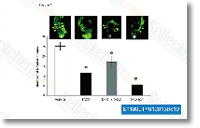In the course of taste cell turn above, aged taste receptor cells degenerate and therefore are replaced by new receptor cells differentiated from the basal cells. Despite the fact that the typical existence span of taste cells is approxi mately 10 days. latest research recommend that some taste cells can last over three weeks from the buds. Many cell death associated proteins, which includes the tumor suppressor protein p53, Bax. and caspases, are expressed inside the taste buds. Nonetheless, it really is unclear what mechanism initi ates the cell death pathways and, hence, determines the life span of taste cells. To maintain structural stability and cell form equilib rium, taste progenitor cells give rise to newborn cells, which enter taste buds and differentiate into different types of mature taste bud cells. Very little is recognized concerning the regulation of progenitor cell proliferation, immature cell differentiation, and taste cell degeneration.
Some experi mental manipulations can perturb these actions of taste bud turnover and disrupt the structural homeostasis. As an example, denervation of peripheral gustatory nerves induces extensive taste cell degeneration by apoptosis, which prospects for the disappearance of taste buds. However, dietary sodium restriction throughout pre and postnatal advancement increases the latency for new born selleck chemical cells to enter taste buds also as taste cell lifestyle span and turnover intervals. The impact of inflammation on taste progenitor cell proliferation and taste bud cell turn in excess of, having said that, has not nevertheless been reported. Irritation mediated by TLR signalling promotes neurodegeneration and continues to be implicated in neurode generative conditions. Furthermore, inflammatory stimuli and proinflammatory cytokines, this kind of as tumor necrosis factor and interleukin six, affect brain neurogenesis by modulating neural progeni tor cell proliferation, newborn cell survival, and neural differentiation.
Taste sensory cells are epithelial cells with neuronal properties. Taste progenitor cells and basal cells express genes such as Sox2 and Mash1 which are also concerned in cell fate determination selleckchem and differenti ation within the nervous process, suggesting that taste bud cells could share cell renewal mechanisms with neurons.  Within this review, we investigated the result of inflam mation on taste progenitor cell proliferation and taste cell turnover applying the LPS induced acute inflammation model. Our benefits present that LPS strongly suppresses the expression of cyclin B2 and E2F1, two important cell cycle regulators, in circumvallate and foliate epithelia. Accord ingly, LPS markedly attenuates taste progenitor cell professional liferation as shown by BrdU labeling experiments and Ki67 immunostaining.
Within this review, we investigated the result of inflam mation on taste progenitor cell proliferation and taste cell turnover applying the LPS induced acute inflammation model. Our benefits present that LPS strongly suppresses the expression of cyclin B2 and E2F1, two important cell cycle regulators, in circumvallate and foliate epithelia. Accord ingly, LPS markedly attenuates taste progenitor cell professional liferation as shown by BrdU labeling experiments and Ki67 immunostaining.
Microrna 1
Combinatorial regulation is a feature of miRNA regulation in animals.
